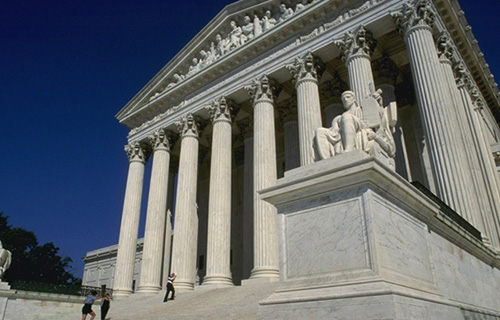
WASHINGTON (PAI) – Workers and public sector unions faced sharp questions about union dues, agency fees and what they’re used for – or not used for – at the U.S. Supreme Court on Jan. 11.
And if the questions and comments from the justices, particularly “swing vote” Justice Anthony Kennedy, are any indication, the unions face another big, 5-4 loss when the jurists decide the top labor case of their 2015-16 session. A decision is due before the end of June.
The case, Friedrichs vs. California Teachers Association et al., pitted a handful of dissident California teachers – funded and backed by the anti-worker, anti-union, radical right National Right to Work Committee (NRTWC) – against California, its teachers unions, the Obama administration and their union and non-union allies.
Technically, the issue is whether state laws that let unions representing public workers collect “agency fees” strictly to pay only for contract negotiations and enforcement – such as grievances – violate the dissident workers’ constitutional free speech rights.
But the real issue, which NRTWC and its backers denied when the justices quizzed them, is whether public worker unions can survive a big loss of revenue as not just present “free riders” refuse to pay, but everyone else does, too. Justice Elena Kagan estimated that thousands of union contracts and 10 million workers could be affected.
The dissidents, represented by NRTWC attorney Michael Carvin, argue that anything a union does, including bargaining contracts and handling grievances, is “political” and thus forcing dissidents to pay agency fees for those functions violates their free speech rights.
“Many of these things”, from class sizes in schools to staffing of fire departments, “are matters of public concern” where the First Amendment and its free speech rights – including a ban on government coercion of individuals to “speak” via agency fees – trump everything else, Justice Kennedy told California Solicitor General Edward Dumont.
“Many teachers disagree” with the union on various issues, Kennedy continued. “The agency fees require that they subsidize unions on the issues they disagree with. The union is making these teachers compelled riders” on its policies.
If the dissidents win, every state and local government would in essence become a so-called “right to work” shop, where anyone could use the union’s services, but not pay for them.
The contest inside the courtroom was mirrored by demonstrations outside, as unionists from AFSCME, the Service Employees, National Nurses United and other unions converged upon the court to show the importance of the case to their rights and livelihoods. A smaller group, marshaled by the right, waved “We ?teachers” signs. One California “religious teachers association” sided with the so-called right-to-work crowd.
Inside, “with the agency fees, unions can do things they can’t do without them,” such as train workers to be more effective, Justice Sonia Sotomayor told Carvin.
“If you’re receiving the benefit of something, why is it hurting your 1st Amendment right” to be asked to pay for it, Sotomayor added. “They (unions) don’t have the right to demand that the other side subsidize them,” Carvin retorted. He gave virtually that same answer to Justice Elena Kagan.
“Their burden of justification is much higher, because they can’t possibly show that abolition of the agency fees would lead to demise of unions,” Carvin told reporters afterwards.
Justice Stephen Breyer commented that “six people inside a room bargaining on wages, hours and working conditions is pretty far” from barring people from exercising their free speech rights. Carvin saw no difference.
Breyer, Kagan, Sotomayor and Justice Ruth Bader Ginsburg repeatedly made the point that dissidents still have their own rights to speak up in public forums and whenever they want, against unions’ policies. Policy advocacy is different from collective bargaining, Breyer said.
By contrast, Justice Antonin Scalia told Dumont: “The problem is that everything that is within collective bargaining is done within the political system,” and thus comes under the First Amendment and its free speech safeguards.
“There are deep public policy implications,” Dumont admitted in reply. “But we’re trying to do two things here: run a government and run a workplace.”
California and other states, he added, decided the best way to run a workplace is to work cooperatively with the one union – at each agency – which a majority of its workers voted in. Agency fees help fund that cooperative work, Dumont said.
David Frederick, speaking for the California Teachers Association, and its union allies, told the court that overriding – throwing out – the 1977 Abood case, which legalized the current agency fee system “would substantially disrupt established labor-management relations and collective bargaining agreements in half of the country.” Those are the states that do not have so-called “right to work” laws.
“We’re talking about a service fee” for the unions “to provide services” to all their covered workers, union and non-union, Frederick added. That drew yet another comment from Kennedy: “You’re comparing them with a whole group of persons who have their own views, who are coerced or compelled” to back other views, via the agency fees.
“I can understand that argument” for keeping the agency fees “if the union is destroyed” without them, but not otherwise, Chief Justice John Roberts said.
Photo: AP

MOST POPULAR TODAY


Zionist organizations leading campaign to stop ceasefire resolutions in D.C. area

High Court essentially bans demonstrations, freedom of assembly in Deep South

Afghanistan’s socialist years: The promising future killed off by U.S. imperialism

Communist Karol Cariola elected president of Chile’s legislature






Comments